人教版的新目标英语九年级8单元的知识点小结及练习题目附答案详解
- 格式:doc
- 大小:78.50 KB
- 文档页数:9
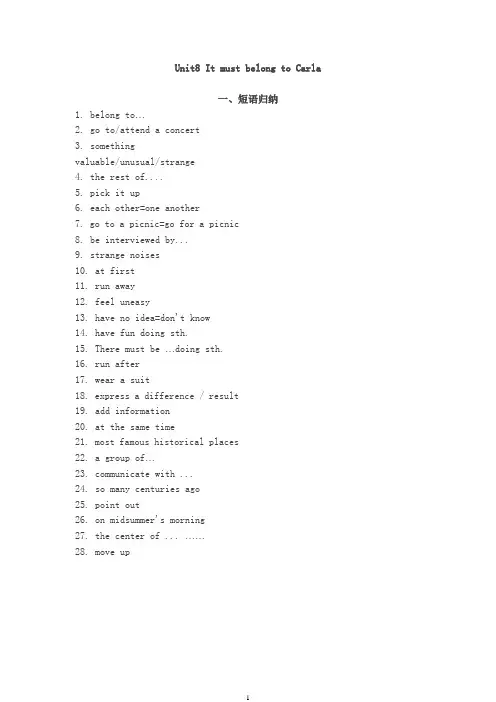
Unit8 It must belong to Carla一、短语归纳1. belong to…2. go to/attend a concert3. somethingvaluable/unusual/strange4. the rest of....5. pick it up6. each other=one another7. go to a picnic=go for a picnic8. be interviewed by...9. strange noises10. at first11. run away12. feel uneasy13. have no idea=don't know14. have fun doing sth.15. There must be …doing sth.16. run after17. wear a suit18. express a difference / result19. add information20. at the same time21. most famous historical places22. a group of…23. communicate with ...24. so many centuries ago25. point out26. on midsummer's morning27. the center of ... ……28. move up二、知识点讲解1. belong to 属于(=be)It must belong to Carla. = It must be Carla's.※练一练※ The notebook must be my friend's.(同义句)The notebook must __________ _______ my friend.※The book must be Jim's.(否定句)The book _________ ________ Jim's.※ The book on the chair must belong to ________. Her name is on thecover.A. herB. hersC. sheD. him2. attend a concert 参加音乐会(go to concert 去听音乐会)【比较应用】attend主要指以观众或听众的身份参加婚礼,丧礼,会议或讲座或上课。
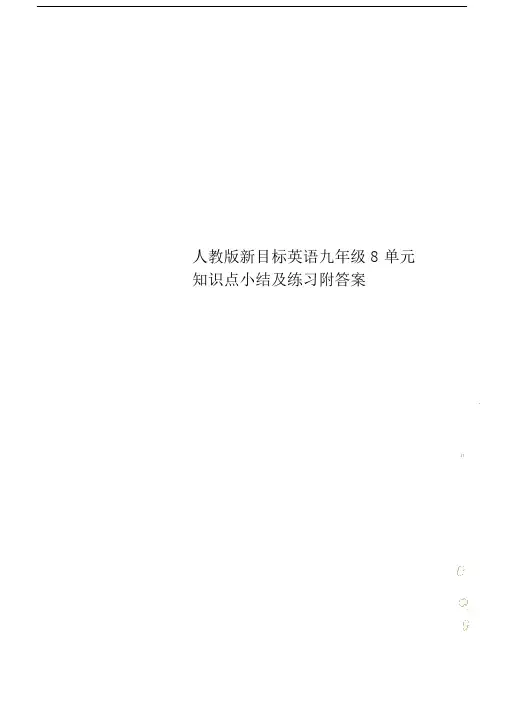
人教版新目标英语九年级 8 单元知识点小结及练习附答案九年英用2016.12.11Unit 8 It must belong to Carla.短1. belong to属⋯于⋯27. run after 追赶2. hair band28. run to do sth. 跑着去3. go to/attend a concert 做某事参加音会29. must be dreaming 一4. in the music hall 在音定在做梦大5.somethingvaluable/unusual 重 / 不常的西6.something strange奇怪的事情7.at the picnic 在野餐8.the rest of.... 其余的⋯⋯9.pick it up 起,拾起10.each other=one another 互相,彼此11.nothing much 没什么30.run for exercise 跑步31.make a movie 拍影32.wear a suit 穿西服 /套装33.express a difference / result 表达差异 / 果34.add information 添加信息35.at the same time 同36.a rock circle 一个石圈37. most famous historical - 1 -九年英用 2016.12.11(事)places 最著名的史名12. go to a picnic=go for apicnic 去野餐38. a group of 一⋯群⋯39. a bit late 有点晚儿13. anything else 其它的40. communicate with ... 西与⋯⋯交流14. be interviewed by... 41. so many centuries ago被⋯采15.strange noises奇怪的16.outside our window 在我的窗外17. next-door neighbor 隔壁居18.at first 首先,起初19.run away 逃走20.feel uneasy 感到不安21.have no idea=don't know 不知道22.a long period of time 很一段多世前42.point out 指出43.put together 放在一起44.in a certain way 以某种方式45. on midsummer's morning 在仲夏的上午46.shine directly into ⋯直接照⋯47.the center of ... 的⋯⋯中心23. have fun doing sth. 做48. move up上升,提升49. the position of...的⋯- 2 -九年英用2016.12.11某事开心位置24. create fear制造恐惧50. burial place 墓地25. There must51. a place to honorbe ⋯ doing sth一.定有⋯ ancestors祭拜祖先的地方在做某事52. celebrate a victoryover an enemy祝26.cough a lot 咳得害人用法集萃1.belong to 属于( =be)It must belong to Carla. = It must be Carla's.※ 一①The notebook must be my friend's(.同句)The notebook must __________ _______ my friend.② The book must be Jim's(. 否定句) The book _________ ________ Jim's.③The book on the chair must belong to________. Her name is on the cover.A. herB. hersC. sheD. him2. attend a concert 参加音会(go to concert 去听音会)【比用】- 3 -九年英用2016.12.11 attend 主要指以众或听众的身份参加婚礼,礼,会或座或上。
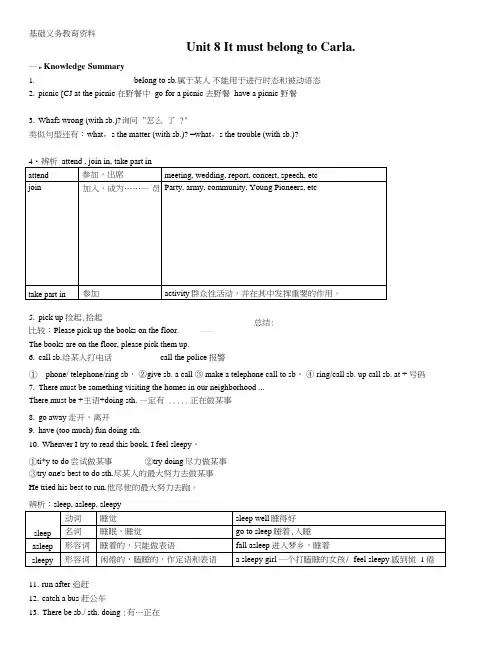
Unit 8 It must belong to Carla.一N Knowledge Summary1. belong to sb.属于某人 不能用于进行时态和被动语态2. picnic [CJ at the picnic 在野餐中 go for a picnic 去野餐 have a picnic 野餐3. Whafs wrong (with sb.)?询问“怎么 了 ?"类似句型还有:what ,s the matter (with sb.)? =what ,s the trouble (with sb.)?4•辨析 attend , join in, take part in5. pick up 捡起,拾起 比较:Please pick up the books on the floor.——一 The books are on the floor, please pick them up.6. call sb.给某人打电话 call the police 报警① phone/ telephone/ring sb ・ ②give sb. a call ③ make a telephone call to sb ・ ④ ring/call sb. up call sb. at + 号码7. There must be something visiting the homes in our neighborhood ...There must be +主语+doing sth. —定有 ..... 正在做某事8. go away 走开,离开9. have (too much) fun doing sth.10. Whenver I try to read this book, I feel sleepy ・①ti*y to do 尝试做某事 ②try doing 尽力做某事③try one's best to do sth.尽某人的最大努力去做某事He tried his best to run.他尽他的最大努力去跑。
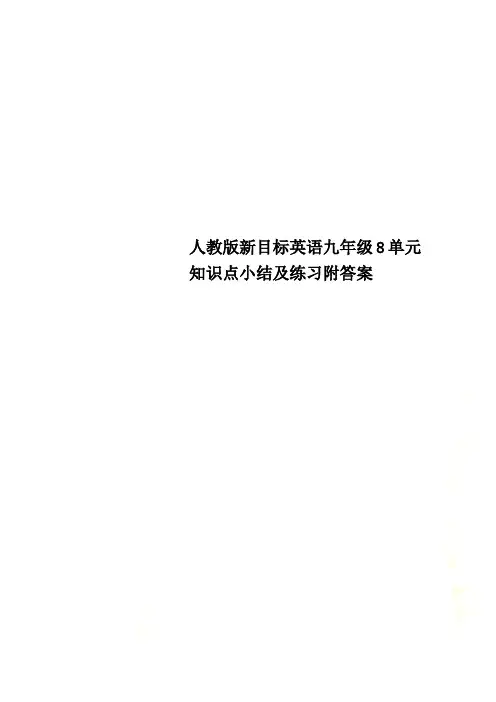
人教版新目标英语九年级8单元知识点小结及练习附答案Unit 8 It must belong to Carla.短语归纳1. belong to… 属于…2. hair band 发带3. go to/attend a concert 参加音乐会4. in the music hall 在音乐大厅5. somethingvaluable/unusual 贵重/不寻常的东西6. something strange 奇怪的事情7. at the picnic 在野餐时8. the rest of.... 其余的……9. pick it up 捡起,拾起10. each other=one another 互相,彼此11. nothing much 没什么27. run after 追赶28. run to do sth. 跑着去做某事29. must be dreaming 一定在做梦30. run for exercise 跑步锻炼31. make a movie 拍电影32. wear a suit 穿西服/套装33. express a difference / result 表达差异/ 结果34. add information 添加信息35. at the same time 同时36. a rock circle 一个石头圈37. most famous historical- 1 -- 2 -(事) 12. go to a picnic=go for a picnic 去野餐 13. anything else 其它的东西 14. be interviewed by... 被…采访 15. strange noises 奇怪的 16. outside our window 在我们的窗外 17. next-door neighbor 隔壁邻居18. at first 首先,起初 19. run away 逃走 20. feel uneasy 感到不安 21. have no idea=don't know 不知道 22. a long period of time 很长一段时间23. have fun doing sth. 做places 最著名的历史名胜38. a group of… 一群… 39. a bit late 有点晚儿40. communicate with ...与……交流41. so many centuries ago 许多世纪前42. point out 指出43. put together 放在一起 44. in a certain way 以某种方式 45. on midsummer's morning 在仲夏的上午46.sh ine directly into…直接照进…47. the center of ... ……的中心 48. move up 上升,提升 49. the position of... …的某事开心24. create fear制造恐惧25. There mustbe …doing sth. 一定有…在做某事26. cough a lot 咳得厉害位置50. burial place 墓地51. a place to honor ancestors祭拜祖先的地方52. celebrate a victory over an enemy庆祝战胜敌人用法集萃1. belong to 属于(=be)It must belong to Carla. = It must be Carla's.※练一练① The notebook must be my friend's.(同义句)The notebook must __________ _______ my friend.② The book must be Jim's.(否定句)The book _________ ________ Jim's.③The book on the chair must belong to ________. Her name is on the cover.A. herB. hersC. sheD. him2. attend a concert参加音乐会(go to concert 去听音乐会)【比较应用】- 3 -attend 主要指以观众或听众的身份参加婚礼,丧礼,会议或讲座或上课。
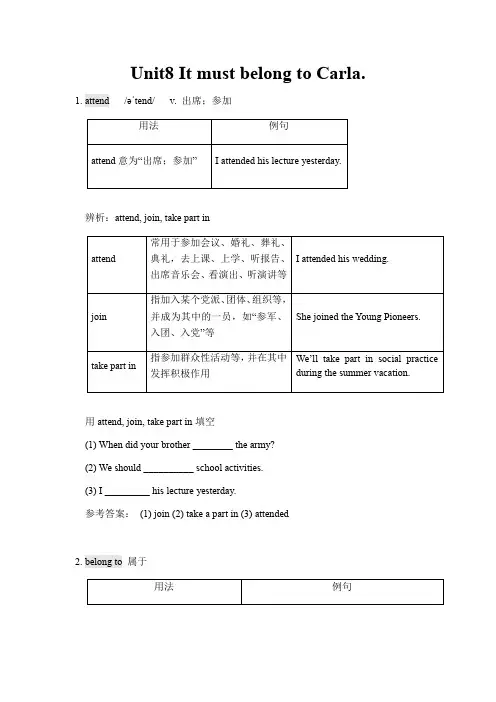
Unit8 It must belong to Carla.1. attend /əˈtend/ v. 出席;参加辨析:attend, join, take part in用attend, join, take part in填空(1) When did your brother________ the army?(2) We should__________ school activities.(3) I _________ his lecture yesterday.参考答案:(1) join (2) take a part in (3) attended2. belong to 属于(1) The book must . She’s the only one who’s studying French.A. belong to Li Ying’sB. be Li YingC. belong Li Ying’sD. belong to Li Ying(2) As is known to us all, China is a developing country ______ the third world.A. belongingB. belongedC. belonging toD. belonged to参考答案:(1)D (2)C3. valuable /ˈvæljuəbl/ adj. 有价值的;贵重的,宝贵的Peter’s father asked him to spend his time on something ______ researching into instead of playing all the time.A. worthyB. valuableC. worthD. precious参考答案:C4. noise /nɔɪz/ v. 噪音辨析:noise; sound与voice用noise; sound与voice填空(1)Don’t speak in such a high__________.(2)Will you please make less__________,boys and girls?(3)We couldn’t hear a_________here.参考答案:(1)voice (2)noise (3)sound5. sleepy /'sliːpɪ/ adj. 困倦的;瞌睡的辨析:sleepy; asleep与sleep(1) —Why are you looking _______ in class all day?—Because I can’t finish my homework until eleven every night.A. awakeB. asleepC. sleepingD. sleepy(2) 选词填空:sleepy; asleep与sleepI often ________ for 8 hours every night.My father fell ________ while he was reading a book.The little boy couldn’t go on studying because he felt ________.参考答案:(1)D (2)sleep; asleep; sleepy6. information /ɪnfə'meɪʃ(ə)n/ n. 信息;消息information 意为“信息、消息”是不可数名词所以没有复数形式,只能够用a lot of, much, little 等词修饰。
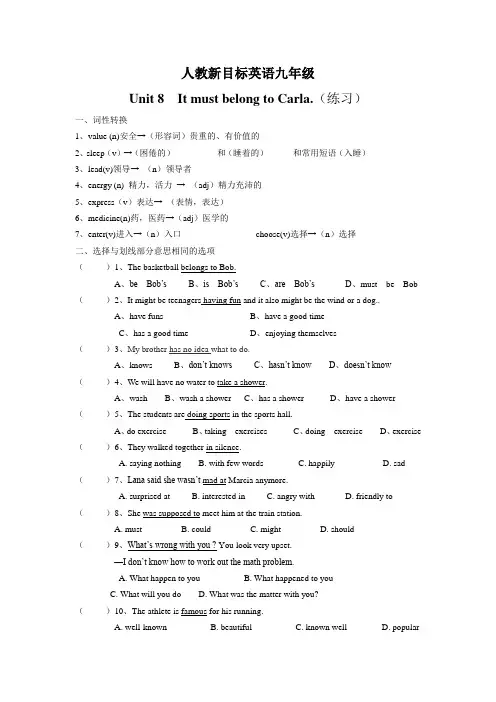
人教新目标英语九年级Unit 8It must belong to Carla.(练习)一、词性转换1、value (n)安全→(形容词)贵重的、有价值的___________2、sleep(v)→(困倦的)__________和(睡着的)______和常用短语(入睡)____________3、lead(v)领导→ (n)领导者____________4、energy (n) 精力,活力→ (adj)精力充沛的_________________5、express(v)表达→ (表情,表达)_________________6、medicine(n)药,医药→(adj)医学的______________7、enter(v)进入→(n)入口______________ choose(v)选择→(n)选择__________二、选择与划线部分意思相同的选项()1、The basketball belongs to Bob.A、be Bob’sB、is Bob’sC、are Bob’sD、must be Bob ()2、It might be teenagers having fun and it also might be the wind or a dog..A、have funsB、have a good timeC、has a good timeD、enjoying themselves()3A、knowsB、don’t knowsC、hasn’t knowD、doesn’t know()4、We will have no water to take a shower.A、washB、wash a showerC、has a showerD、have a showerA、do exerciseB、taking exercisesC、doing exerciseD、exercise ()6、They walked together in silence.A. saying nothingB. with few wordsC. happilyD. sad ()7、Lana said she wasn’t mad at Marcia anymore.A. surprised atB. interested inC. angry withD. friendly to()8、She was supposed to meet him at the train station.A. mustB. couldC. mightD. should()9、What’s wrong with you ? You look very upset.—I don’t know how to work out the math problem.A. What happen to youB. What happened to youC. What will you doD. What was the matter with you?()10、The athlete is famous for his running.A. well-knownB. beautifulC. known wellD. popular三、单项选择()1、—Is that your bike? Can I use it for a while?—No, it doesn’t _____me. It is John’s.A. take toB. belong toC. belongD. turn to()2、That dictionary belongs to ____________.A、heB、sheC、theyD、her()3、There is ___water on the floor. That’s ___wet.A. too much; too muchB. much too; much tooC. too much; much tooD. much too; too much()4、— Jill looks so painful, there ____ be something wrong with her.—Oh dear! We’d better take her to the nearest hospital at once.A. canB. shouldC. wouldD. must()5、—What’s Tom going to do next Sunday?—I’m not sure. He ______go to the country to see his uncle.A. canB. mustC. willD. may()6、—Look, Sue is over there. —That ____ be her. She is in Canada now.A. mustn’tB. can’tC. needn’tD. won’t()7、— Did you hear any strange _____when the quake happened?— No, I was in my garden with my flowers and was enjoying the beautiful_____of my birds at that time.A. voice; noiseB. noise; soundC. whisper; soundD. sound; voice ()8、If anything ____ the machine, please let us know.A. happens onB. happens toC. happened onD. will happen to()9、—Why do you get up so early every day?—To ____ the school bus, or I’ll be late for school.A. catchB. driveC. bringD. take()10、We often see Bob ________ ping-pong in the park.A.play B.to play C.playing D.played()11、This will help prevent the children _____the disease.A. catchB. to catchC. from catchingD. caught()12、—Do you think most of the people in Beijing can talk with foreigners in English?—Yes, I think so. ____ the young ____ the old are learning to speak English.A. Either; orB. Neither; norC. Between; andD. Not only; but also()13、______ Lucy ______ Lily may go dancing with you, because they are not allowed to go out on school nights.A. Either; orB. Neither; norC. Both; andD. Not only; but also()14、— Excuse me. Is this the right way to the Summer Palace?— Sorry, I am not sure. It ________ be.A. mightB. willC. mustD. can()15、—Isn’t that Ann’s husband over there?— No, it ____ be him—I’m sure he doesn’t wear glasses.A、can’t B. must not C. won’t D. may not()16、You ______ be tired—you’ve only been working for an hour.A. must notB. won’tC. can’tD. may not()17、He was so tired that he fell fast _______.A. sleepingB. asleepC. sleepyD. sleep()18、Seeing their teacher _______ into the classroom, they stopped _______ at once.A. walk; tellingB. entering; to speakC. enter; to tellD. walking; talking ()19、When he saw a wallet on the ground, he ______at once and turned it to the police.A. picked it upB. gave it upC. picked up it D、gave up it()20、—Is Tom in the next room?—Well, it’s hard to say. But I heard him loudly when I passed by just now.A. speakB. to speakC. spokenD. speaking()21、This book ______ Tom’s father’s, because his name is on the book.A. maybeB. may beC. must beD. must()22、Look! There is some paper on the ground.Let's ________.A.pick it up B.pick up it C.pick them up D.pick up them()23、Mr.Green ________ the meeting and gave a report.A.attend B.attending C.attended D.to attend()24、—________ English book is this?—Maybe it is Lucy's.A.Who B.Whom C.When D.Whose()25、Many things in the museum were ________ last week.A.steal B.stole C.stolen D.stealing()26、The children are having fun ________ on the playground.A.to play B.play C.playing D.played()27、________ you come, you can see beautiful flowers in our school yard.A.Whatever B.Wherever C.Whenever D.Whoever()28、—Is Mr.Smith over there?—It ________ be him.He has gone to Beijing on business.A.can't B.must C.might D.can()29、Driving carefully can prevent accidents________ happening.A.of B.to C.away D.from()30、It's our duty to prevent the environment ________ being polluted .A.of B.for C.from D.in四、用适当形式填空1、Listen! There must be someone______________ (knock).2、The ________ (write) is very famous3、This book is ________ (value) for us to learn English.4、The ________ (policeman) were searching the forest for the lost kid.5、I________ (use) to be afraid of dark.6、Tom wears a pair of ________ (glass).7、The little boy feels ________ (sleep) at noon.8、She wants to take a ________ (show).9、The machine is a ________ (medicine) tool10、The Nile River (尼罗河) is the ________ (long) river in the world.11、You look really ________(worry). What’s wrong?12、There is a cat ________(climb) the tree.13、Maria saw something ________(run) past her, but she didn’t know what it was.14、Judy wants to be a___________(sing), but we want to be ________ (history) when we grow up.15、Since she was feeling____________________(energy), she started immediately.(立刻)16、Visitors enter through a side _____________( enter)17、he was too tired and fell________________ (sleep) at once.18、Let the TV down.It's too______________( noise).19、That film is worth _____________________(see).20、______________(who)book is this?五、根据汉语提示完成句子,并注意适当形式。
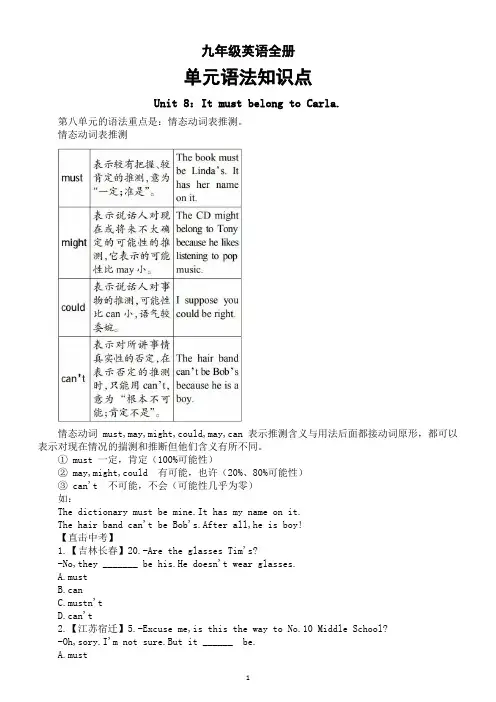
九年级英语全册单元语法知识点Unit 8:It must belong to Carla.第八单元的语法重点是:情态动词表推测。
情态动词表推测情态动词 must,may,might,could,may,can 表示推测含义与用法后面都接动词原形,都可以表示对现在情况的揣测和推断但他们含义有所不同。
① must 一定,肯定(100%可能性)② may,might,could 有可能,也许(20%、80%可能性)③ can't 不可能,不会(可能性几乎为零)如:The dictionary must be mine.It has my name on it.The hair band can't be Bob's.After all,he is boy!【直击中考】1.【吉林长春】20.-Are the glasses Tim's?-No,they _______ be his.He doesn't wear glasses.A.mustB.canC.mustn'tD.can't2.【江苏宿迁】5.-Excuse me,is this the way to No.10 Middle School?-Oh,sory.I'm not sure.But it ______ be.A.mustB.shouldC.needD.mayUnit 9:I like music that I can dance to.第九单元的语法重点是:定语从句。
定语从句★定语从句:在复合句中,修饰某一名词或代词的从句叫做定语从句。
定语从句可以分为限制性定语从句和非限制性定语从句。
本单元主要学习由 who、that、which 引导的限制性定语从句。
★先行词:被定语从句所修饰的名词或代词称为先行词。
★关系代词:引导定语从句的关联词称为关系代词。
关系代词在定语从句中有三个作用:(1)引导定语从句;(2)代替先行词;(3)在定语从句中充当一个成分。
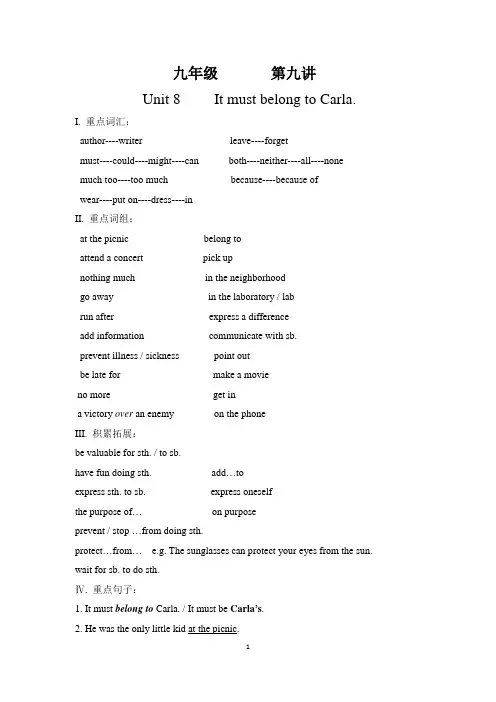
九年级第九讲Unit 8 It must belong to Carla.I. 重点词汇:author----writer leave----forgetmust----could----might----can both----neither----all----nonemuch too----too much because----because ofwear----put on----dress----inII. 重点词组:at the picnic belong toattend a concert pick upnothing much in the neighborhoodgo away in the laboratory / labrun after express a differenceadd information communicate with sb.prevent illness / sickness point outbe late for make a movieno more get ina victory over an enemy on the phoneIII. 积累拓展:be valuable for sth. / to sb.have fun doing sth. add…toexpress sth. to sb. express oneselfthe purpose of…on purposeprevent / stop …from doing sth.protect…from… e.g. The sunglasses can protect your eyes from the sun. wait for sb. to do sth.Ⅳ. 重点句子:1. It must belong to Carla. / It must be Carla’s.2. He was the only little kid at the picnic.3. She was at the picnic, wasn’t she?4. But then the schoolbag could belong to Rita. She’s always forgetting things.5. I attended a concert yesterday so it might still be in the music hall.6. Do you have anything valuable in your schoolbag?7. So it can’t be stolen.8. I remember I had my schoolbag with me at the picnic.9. I think somebody must have picked it up. I’ll call them now to check if anybody has it.10. Nothing much ever happened around here.11. … but my friend and I think it must be teenagers having fun.12. One woman in the area saw something running away, …13. Everyone in our town is feeling uneasy, and everyone has his or her own ideas.14. There must be something visiting the homes in our neighborhood, …15. The noise- maker is having too much fun creating fear in the neighborhood.16. I wonder what’s happening / going on.17. He could be running for exercise.18. And there’s something strange getting out.19. He might be running to catch a bus to work.20. Stonehenge, a rock circle, is not only one of Britain’s most famous historicalplaces but also one of its greatest mysterious.21. People like to go to this place especially in June as they want to see the sun risingon the longest day of the year.22. For many years, historians believed Stonehenge was a temple where ancientleaders tried to communicate with the gods.23. The large stones were put together in a certain way.24. They think the stones can prevent illness and keep people healthy.25. No one is sure what Stonehenge was used for, but most agree that the position ofthe stones must be for a special purpose.26. The sun shines straight into the center of Stonehenge because the stone were putin a special position.27. Some people think that rocks can not only stop people from becoming ill but alsokeep them healthy.28. We don’t know who built Stonehenge or how it was built.29. Can you think of any other mysterious,either in China or another part of theworld, that / which are similar to Stonehenge?30. The sweater must be Carla’s. She’s the only one who wears such colorful clothes. 话题语法:1. 进行推测、判断2. 情态动词(can might could must)的用法can, could, may, might, must 皆可表示推测,其用法如下:1)情态动词+动词原形。
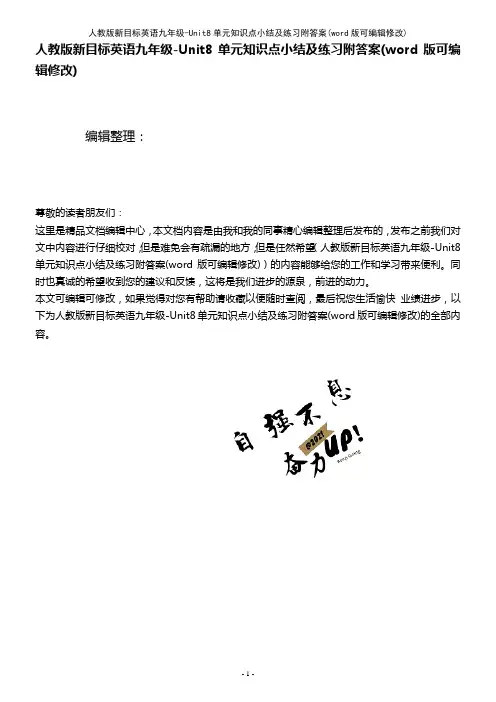
人教版新目标英语九年级-Unit8单元知识点小结及练习附答案(word版可编辑修改)编辑整理:尊敬的读者朋友们:这里是精品文档编辑中心,本文档内容是由我和我的同事精心编辑整理后发布的,发布之前我们对文中内容进行仔细校对,但是难免会有疏漏的地方,但是任然希望(人教版新目标英语九年级-Unit8单元知识点小结及练习附答案(word版可编辑修改))的内容能够给您的工作和学习带来便利。
同时也真诚的希望收到您的建议和反馈,这将是我们进步的源泉,前进的动力。
本文可编辑可修改,如果觉得对您有帮助请收藏以便随时查阅,最后祝您生活愉快业绩进步,以下为人教版新目标英语九年级-Unit8单元知识点小结及练习附答案(word版可编辑修改)的全部内容。
Unit 8 It must belong to Carla.短语归纳1。
belong to… 属于… 2。
hair band 发带 3。
go to/attend a concert 参加音乐会 4. in the music hall 在音乐大厅 5. something valuable/unusual 贵重/不寻常的东西 6。
something strange 奇怪的事情 7。
at the picnic 在野餐时 8。
the rest of.。
.. 其余的…… 9. pick it up 捡起,拾起 10。
each other=one another 互相,彼此 11。
nothing much 没什么(事) 12。
go to a picnic=go for a picnic 去野餐 13。
anything else 其它的东西 14。
be interviewed by 。
.。
被…采访 15. strange noises 奇怪的 16. outside our window 在我们的窗外 17. next —door neighbor 隔壁邻居 18。
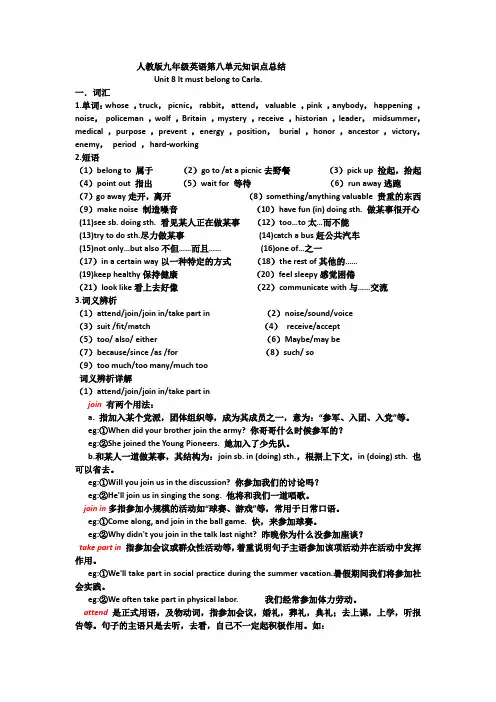
人教版九年级英语第八单元知识点总结Unit 8 It must belong to Carla.一.词汇1.单词:whose ,truck,picnic,rabbit,attend,valuable ,pink ,anybody,happening ,noise,policeman ,wolf ,Britain ,mystery ,receive ,historian ,leader,midsummer,medical ,purpose ,prevent ,energy ,position,burial ,honor ,ancestor ,victory,enemy,period ,hard-working2.短语(1)belong to 属于(2)go to /at a picnic去野餐(3)pick up 捡起,拾起(4)point out 指出(5)wait for 等待(6)run away逃跑(7)go away走开,离开(8)something/anything valuable 贵重的东西(9)make noise 制造噪音(10)have fun (in) doing sth. 做某事很开心(11)see sb. doing sth. 看见某人正在做某事(12)too…to太…而不能(13)try to do sth.尽力做某事(14)catch a bus赶公共汽车(15)not only…but also不但……而且……(16)one of…之一(17)in a certain way以一种特定的方式(18)the rest of其他的……(19)keep healthy保持健康(20)feel sleepy感觉困倦(21)look like看上去好像(22)communicate with与……交流3.词义辨析(1)attend/join/join in/take part in (2)noise/sound/voice(3)suit /fit/match (4)receive/accept(5)too/ also/ either (6)Maybe/may be(7)because/since /as /for (8)such/ so(9)too much/too many/much too词义辨析详解(1)attend/join/join in/take part injoin 有两个用法:a. 指加入某个党派,团体组织等,成为其成员之一,意为:“参军、入团、入党”等。
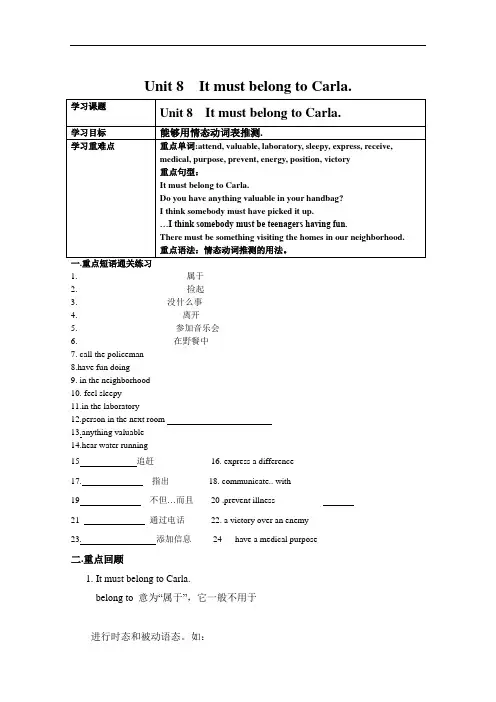
Unit 8 It must belong to Carla.一.重点短语通关练习1._______________________属于2.________________________ 捡起3. ___________________ 没什么事4. _____________________ 离开5. ______________________参加音乐会6._____________________ 在野餐中7. call the policeman __________________________8.have fun doing _____________________9. in the neighborhood _______________________10. feel sleepy ______________________11.in the laboratory ________________________12.person in the next room ________________________13.anything valuable ________________________14.hear water running ________________________15 追赶16. express a difference________________17. 指出18. communicate.. with ________________19 不但…而且20 .prevent illness ______21 通过电话22. a victory over an enemy _____________23. 添加信息24 have a medical purpose _______________二.重点回顾1. It must belong to Carla.belong to 意为“属于”,它一般不用于进行时态和被动语态。
新目标九年级英语Unit 8 It must belong to Carla 课前检测一.根据汉语写出单词。
1. ______________ 宝贵的_____________ 价值(n.) _______2.出席3•实验室_________ 4.困倦的___________ 睡觉(v・)________ 5•着陆;降落_______ 6. _________________ 阻止;阻挠___________ 7.位置;龜方__ &敌人__________ 9.精力__________________10.目的;目标___________ 11.胜利_________ 12.狼_______ (复数形式) _________ 重点短语1.(sth) belong to (sb)属于某人2.(sth) be one's 是某人的3.at the picnic 野餐4.attend a concert/meeting 参加音乐会/会议5.the rest of ......... 剩余部分6.pick up拾起,采摘,开车接某人7.at first 起初8.run away 逃跑9.feel uneasy感到不安10.There be sb/sth doing sth1 l.in the neighborhood 街坊,街区12.have no idea 不知道13.have fun (in) doing sth.14.feel sleepy昏昏欲睡的15.run after 追逐16.wear a suit 穿西装17.catch a bus赶公交车18.one of + the+最高级+名词复数19.one of Britain's most famous historical places 英国最有名的历史遗迹之一20.one of its greatest mysteries 最人的秘密之一municate with sb 交流22.point out 指出23.in a certain way 以某种方式24.on midsummer^ morning 在仲夏的早晨25.have a medical purpose 医学目的26.prevent illness 防御疾病27.a burial place 一个供埋葬的地方28.a place to honor ancestors 纪念祖先的地方29.celebrate a victory over an enemy 庆祝打败敌人的胜利30.a long period of time 很长一段时间31 .a group of volunteers 一群志愿者32.stop sb from doing sth阻止某人做某事33.go to the concert 参加音乐会34. talk...on the phone 打电话35. at work 在工作36. right now 现在二.词组翻译。
最新人教版九年级英语第八单元Unit8(知识点+习题)一、短语归纳最新人教版九年级英语第八单元Unit8(知识点+习题)2. go to/attend a concert3. something valuable/unusual/strange4. the rest of....5. pick it up6. each other=one another7. go to a picnic=go for a picnic8. be interviewed by...9. strange noises10. at first11. run away12. feel uneasy13. have no idea=don't know14. have fun doing sth.15. There must be …doing sth.16. run after17. wear a suit18. express a difference / result19. add information20. at the same time21. most famous historical places22. a group of…2324. so many centuries ago25. point out26. on midsummer's morning27. the center of ... ……28. move up最新人教版九年级英语第八单元Unit8(知识点+习题)1. belong to 属于(=be)It must belong to Carla. = It must be Carla's.※练一练① The notebook must be my friend's.(同义句)The notebook must __________ _______ my friend.② The book must be Jim's.(否定句)The book _________ ________ Jim's.③ The book on the chair must belong to ________. Her name is on the cover.A. herB. hersC. sheD. him2. attend a concert参加音乐会(go to concert 去听音乐会)【比较应用】attend主要指以观众或听众的身份参加婚礼,丧礼,会议或讲座或上课. join in参加某项活动,尤指参加正在进行的活动.join 参加某个组织、党团、俱乐部等机构,成为其中一员.take part in参加某些活动或工作,在其中起了作用.(可和join in 互换)※练一练Mr. John invited many friends to _______ his wedding.A. take part inB. joinC. join in D attend3. anything valuable贵重的东西当形容词修饰something,anything,nothing,everything等复合不定代词时,后置.something unusual anything strange nothing important※练一练In this book,you can learn________.A. something educationalB. educational somethingC. anything educationalD. educational anything4. the rest of my friends 我剩下的朋友the rest of... (剩余的……)作主语,谓语动词的单复数由of 后边的名词决定.※练一练①The rest of the books_____dull.②The rest of oil _____not enough.5. ...must have picked it up. ……一定是捡起它了.⑴must have done sth(过去一定做某事了)表示对过去的事情的推测⑵pick up捡起(代词放中间)※练一练When he saw a wallet on the ground,he _______ at once.A. picked it upB. gave it upC. picked up itD. worked it out6. happen与take place 发生(无被动式)⑴ happen 特别指那些偶然或未能预见的事件发生.Sth. happened to sb.某人发生了某事Sb. happened to do sth.某人碰巧做某事⑵ take place 指某事按计划进行或按计划发生.★take place有“举行”之意,而happen有“碰巧”的意思.※练一练①A strange thing happened _____ her last night,so she is afraid to stay at home alone tonight.A. atB. forC. withD. to②Great changes _________________(发生)in China since the last thirty years.③The meeting _________________(举行)next Friday.④ _________________(碰巧)that I had no money on me.7. There must be something visiting the homes. 一定有什么东西光顾这些住户.⑴There be+主语+doing sth.有某人(物)正在做某事(表存在)There are some people surfing on the sea,aren't there?There is a cat eating fish in the corner.⑵There must be +主语+doing 一定有某人(物)正在做……(对某种存在的推测)There must be someone playing the violin there. 准有人在那里拉小提琴.※练一练①There _____________________________________________ in the forest.一定有人在森林里砍树.②There _______________________________ in the tree.树上有只鸟儿在唱着歌.8. feel sleepy 感动困乏sleepy adj. 困乏的,昏昏欲睡的sleepy expression(懒洋洋的表情)asleep adj. 睡着的(表语形容词)fall/be asleep①In spring,people often feel_________(sleep)②I didn't have a good_____ last night,so I was ______ and I fell _____ in class.A. sleep; asleep; sleepB. asleep; sleep; sleepyC. sleep; sleepy; asleepD. sleepy; sleep; asleep9. ...not only one of Britain's most famous historical places but also one of its greatest mysteries.⑴not only... but also...不但……而且……⑵either... or... 要么……要么……;不是……就是……(两者选择其一)⑶neither... nor...既不……也不……(两者都不)⑷both... and... ……和……(两者)都这四组连词都可以用来连接两个性质相同的并列成分,作主语、谓语、宾语或表语等,但⑴⑵⑶在连接句子主语时,谓语动词采取“就近原则”.both... and... 连接两个主语时,谓语动词通常用使用复数形式.Neither he or she works here. 他和她都不在这里工作.(主语)你要么跟我一块去,要么走回家去.(谓语)I have neither time nor money. 我既没时间也没钱.(宾语)He is not only a teacher,but also an actor. 他不仅是一名教师,也是一位演员.(表语)Either you or I am wrong. 不是你错就是我错.(表语)You may stay either in a hotel or in a private house. 你可以住在饭店或私人的家里.(地点状语)g back either today or tomorrow. 她不是今天来就是明天来.(时间状语)※练一练①Both my father and my mother _____(be )teachers hard.②-I hear _____ your father _____ your mother likes watching Beijing Opera.-Yes,they both love it very much.A. both; andB. either; orC. Neither; norD. not only; but also③Not only my friends but also I _____ interested in football and Messi is our favorite star.A. beB. amC. isD. are④ Would you like some juice or coffee?-_____ is OK. I really don't care.A. BothB. EitherC. NeitherD. All⑤ Both Tom and Lucy like music that is relaxing. (改为否定句)______ Tom______ Lucy ______ music that is relaxing.⑥ Would you like some juice or coffee?-______. I really don't mind.A. EitherB. NeitherC. Both D All★not only … but also连接两个分句时,not only可用于句首,第一个从句主谓要倒装.Not only is he clever,but also he is hard working.10. ... another popular idea. 另一个受欢迎的主意.【迷津点拨】other,the other,others,the others,another⑴ other adj.别的,其他的pron. 其余的(人或事物)Do you have any other question(s)?We need to help each other.⑵ the other特指两者中的另一个.经常构成:one... the other...(the other = the other +单数名词)He has two daughters. One is a nurse,the other is a worker.⑶others 特指某一范围内的人或物除去一些外,剩下部分中的另一些(不是全部).经常构成:some... others... ,others...Some of us like singing and dancing,others like sports,others like....有时也泛指其他的人或物:We must help others.(我们必须帮助别人.)⑷ the others 特指某集体中除了一个(些)后,剩下的部分(全部).the others = the other +复数名词Two boys will go to the zoo,and the others will stay at home.⑸ another 泛指同类事物中(三者或三者以上或数量不明)另一个.经常构成: one... another... ,another...(another = another +单数名词)I don't like this one. Please show me another.★表示“再、又,还”时:another +基数词+名词复数=基数词+ more +名词复数I'll be here for another two weeks/two more weeks.※练一练① These cakes are very delicious,I want to have_____ one.A. otherB. the otherC. othersD. another②Many people are in the zoo. Some are watching animals,and ______ are taking photos.A. the otherB. the othersC. othersD. another.③New Zealand has two islands. One is North Island and ______ is South Island.A. anotherB. the other C other D. the others11. 含有way的短语in the way 妨碍;挡道in the way of 防碍……in a certain way 按一定的方法in a/some way(s) 在某方面,在某种程度(意义)上,以某种方式by the way 顺便说一下on the way(to.. )在(去……)的路上go out of one's way 格外努力※练一练The car is _____,can you park it to another place?A. in the wayB. by the wayC. in the endD. in style12. ...prevent illness and keep people healthy. 预防疾病和保持人们健康.prevent sb. (from) doing sth. =stop sb. (from) doing sth.★keep sb. doing让某人一直做某事※练一练①Plants prevent the sun from ____________(make)the earth drier.②The heavy rainstorm stopped him from returning. (同义句)The heavy rainstorm ___________ him _______ ______________.③She closed the gate to prevent the dog ____ going out of the garden.A. atB. onC. ofD. from13. ...it receives more than 750,000 visitors.receive 收到;接到(被动)accept 接受;接纳(主动)He received the present,but he didn't accept it. 他收到了礼物,但没有接受. ※练一练①On her birthday ,she ____ a gift from a boy,but she didn't _____ it.A. received ,receiveB. accepted ; acceptC. received ; acceptD. accepted ; receive②His family are worried about him because they haven't _______ letters from him for a long time.A. acceptedB. receivedC. writtenD. collected三、语法回顾(肯定猜测和否定猜测)⑴must一定,肯定(可能性100%,疑问、否定用can,can't)⑵may/could可能,也许(可能性50%,疑问否定用could,couldn't)⑶ might有可能,差不多(可能性30%)※练一练① Whose T-shirt is this?-It_______ be John's. It's ________small for himA. can't ; much tooB. can't; too muchC. mustn't ; too muchD. mustn't ; much too② I hear that Bob is in hospital. He ______be ill.A. mustB. shouldC. wouldD. can't③ This could be Robert's basketball.(提问)_________ basketball _________ this _______?四、课后作业作业①:习题单项选择.一、( )31. — Tony is ________ man.— Yes. He is the tallest in his class.A. quite a tallB. a quite tallC. quite tall aD. tall a quite( )32. — ________ books are these?— I am not sure. They may belong to Peter.A. WhichB. WhoC. WhoseD. Whom( )33. — The famous star was interviewed ______ the local newspaper.— Yes,I also heard the news.A. ofB. byC. asD. with( )34. —What’s Lily’s favorite color?— _____.A. PianoB. PandaC. PieD. Pink( )35. —Don’t throw these books. They may be ________ to you.—OK. I won’t.A. convenientB. awfulC. valuableD. useless( )36. — Carl,________ are you late for school?— Because my bike is broken.A. whyB. whenC. howD. where( )37. There are ________ stars in the sky.A. millionsB. millions ofC. million( )38. — Did you _________ the letter from your pen pal?— No,I didn’t.A. avoidB. reportC. writeD. receive( )39. — Edison was one of _______ inventors in the world.— Yes,I agree.A. the greaterB. greaterC. the greatestD. greatest( )40. — Can he help us?—I’m not sure. He ________ help us solve this mystery.A. mightB. mustC. shouldn’tD. mustn’t( )41. — The visitors knew little about the island when they ________ there.— Really? What did they do first?A. arriveB. have arrivedC. would arrive( )42. — He has never seen the movie,________?— No,he hasn’t.A. is heB. has heC. isn’t heD. hasn’t he( )43. Not only you but also he _______ on well with the new students.A. getB. gettingC. getsD. to get( )44. I hear ________ he will be back in two days.A. thatB. whereC. ifD. when( )45. — Whose baseball is this?— ________ He loves baseball.A. So do I.B. I enjoy playing baseball.C. I don’t know.D. It must be Nick’s.二、完形填空.Justin and Mary woke up early. 46 told them about a monster that haunted (怪兽出没) the lake D. tall a quite D. million of D. arrived yesterday. It was only 5:00 AM,so 47 else in the house was still asleep. Mary and Justin went to the boat dock (码头). It was too foggy (有雾的) to 48 anything. Do you think Uncle Thomas was just trying to scare (惊吓) us?” Justin said. Mary said,“ 49 what he said? The monster haunts the lake. The people in the story were in 50 .” “You want to go out on the water? Mom will be angry,” Justin said. “Maybe we don’ t have togo anywhere. We 51 sit in the boat while it’ s docked (停靠码头). That would be safe,” Mary said. Justin carefully climbed into the boat first. Then Mary climbed into the boat and sat 52 him. They looked around,and gradually,the sun began to rise. Mary suddenly shouted,“The monster!” They hugged each other in fear,but then they heard a laugh. Justin realized something and said,“Uncle Thomas?” “I knew that you would get up 53 because of my story,” Uncle Thomas said. Mary and Justin were 54 that there was no monster after all. Uncle Thomas laughed,“I brought 55 for us. Are you hungry?” “Yes,we are. Let’s have breakfast,” Mary and Justin said.( )46. A. Uncle Thomas B. Their mother C. Their father D.Their teacher ( )47. A. everything B. anything C. everyone D. nothing( )48. A. feel B. catch C. hear D. see( )49. A. Remember B. Imagine C. Attend D. Receive( )50. A. buses B. trains C. boats D. planes( )51. A. must B. mustn’t C. couldn’t D. can( )52. A. beside B. outside C. of D. for D. for( )53. A. slowly B. suddenly C. early D. late( )54. A. happy B. sad C. nervous D. afraid( )55. A. lunch B. breakfast C. supper D. pocket三、阅读理解.I was woken up by a strange sound. I was terrified and ran downstairs. I found my mom in the kitchen,getting my brother ready for school. “Mom,did you hear anything? I,uh,I thought I saw an alien.” D. In 1898. Just a dream!” Mom answered. As I walked to the window,I cried. I saw a little alien with big and black eyes. It tried to run between my legs. Although I was scared,for some reason,I squeezed (挤) my legs together in time to catch it. It took out something and hurt me.I felt a terrible sense of nothingness and fainted (晕倒). Then I woke up. At first,I could hardly move. I wasn’t sure whether I had had a dream or not. I stood up and walked downstairs. I saw my mom in the kitchen. She was really getting my brother ready for school,wearing her pink clothes. Then I realized it was just a dream because in my dream she was wearing her work clothes. From then on,I always dreamt about aliens. At that time,I really thought maybe I had some kind of relationship (关系) with aliens. Later I realized that I used to have those dreams because I always read books or watched TV programs about aliens!( )61. What did the writer do when he saw the alien?A.He was too scared to move.B.He knew it was a dream and w asn’t afraid.C. He was so scared that he fainted.D. He wanted to catch the alien. ( )62. The underlined word “nothingness” in the passage means “________” in Chinese.A. 虚无B. 无奈C. 兴奋D. 开心( )63. The writer found that it was just a dream ______.A. as soon as he woke upB. before he went downstairsC. when he saw his motherD. when he was hurt by the alien( )64. Which of the following is TRUE according to the passage?A.The writer had the dream at noon.B. The writer’s mother’s work clothes might not be pink.C. The writer’s mother was worried about his dream.D. When the writer had the dream,his family were out.( )65. Why did the writer use to have dreams about aliens?A. He had some kind of relationship with aliens.B. He was terribly ill.C. He maybe did something about aliens before going to bed .D. The dreams were all about the writer’s real experiences.。
Unit 8 It must belong to Caral短语归纳1. belong to… 属于…2. hair band 发带3. go to/attend a concert 参加音乐会4. in the music hall 在音乐大厅5. something valuable/unusual 贵重/不寻常的东西6. something strange 奇怪的事情7. at the picnic 在野餐时8. the rest of.... 其余的……9. pick it up 捡起,拾起10. each other=one another 互相,彼此11. nothing much 没什么(事)12. go to a picnic=go for a picnic 去野餐13. anything else 其它的东西14. be interviewed by... 被…采访15. strange noises 奇怪的16. outside our window 在我们的窗外17. next-door neighbor 隔壁邻居18. at first 首先,起初19. run away 逃走20. feel uneasy 感到不安21. have no idea=don't know 不知道22. a long period of time 很长一段时间23. have fun doing sth. 做某事开心24. create fear制造恐惧25. There must be …doing sth. 一定有…在做某事26. cough a lot 咳得厉害27. run after 追赶28. run to do sth. 跑着去做某事29. must be dreaming 一定在做梦30. run for exercise 跑步锻炼31. make a movie 拍电影32. wear a suit 穿西服/套装33. express a difference / result 表达差异/ 结果34. add information 添加信息35. at the same time 同时36. a rock circle 一个石头圈37. most famous historical places 最著名的历史名胜38. a group of… 一群…39. a bit late 有点晚儿40. communicate with ...与……交流41. so many centuries ago许多世纪前42. point out 指出43. put together 放在一起44. in a certain way 以某种方式45. on midsummer's morning 在仲夏的上午46.shine directly into… 直接照进…47. the center of ... ……的中心48. move up 上升,提升49. the position of... …的位置50. burial place 墓地51. a place to honor ancestors祭拜祖先的地方52. celebrate a victory over an enemy庆祝战胜敌人用法集萃1. belong to 属于(=be)It must belong to Carla. = It must be Carla's.※练一练① The notebook must be my friend's.(同义句)The notebook must __________ _______ my friend.② The book must be Jim's.(否定句)The book _________ ________ Jim's.③ The book on the chair must belong to ________. Her name is on the cover.A. herB. hersC. sheD. him2. attend a concert参加音乐会(go to concert 去听音乐会)【比较应用】attend主要指以观众或听众的身份参加婚礼,丧礼,会议或讲座或上课。
精品文档Unit8 It must belong to Carla、短语归纳1. bel ong to …2. go to/atte nd a con cert3. someth ing valuable/unu sual/stra nge4. the rest of....5. pick it up6. each other=one ano ther7. go to a pic ni c=go for a pic nic8. be in terviewed by...9. stra nge no ises10. at first11. run away12. feel un easy13. have no idea=d on't know14. have fun doing sth.15. There must be …dsihg16. run after17. wear a suit18. express a differe nee / result19. add in formati on20. at the same time 21. most famous historical places22. a group of …23. com muni cate with ...24. so many cen turies ago25. point out26. on midsummer's morning27. the cen ter of ... -28. move up精品文档二、知识点讲解1. belong to 属于(=be)It must belong to Carla. = It must be Carla's.※练一练①The notebook must be my friend's(. 同义句)The notebook must _________ ______ my friend.②The book must be Jim's(. 否定句)The book ________ _______ Jim's.③The book on the chair must belong to _______ . Her name is on the cover.A. herB. hersC. sheD. him2. attend a concert 参加音乐会(go to concert 去听音乐会)【比较应用】attend 主要指以观众或听众的身份参加婚礼,丧礼,会议或讲座或上课。
Unit 8 It must belong to Carla.短语归纳1. belong to… 属于…2. hair band 发带3. go to/attend a concert 参加音乐会4. in the music hall 在音乐大厅5. something valuable/unusual 贵重/不寻常的东西6. something strange 奇怪的事情7. at the picnic 在野餐时8. the rest of.... 其余的……9. pick it up 捡起,拾起10. each other=one another 互相,彼此11. nothing much 没什么(事)12. go to a picnic=go for a picnic 去野餐13. anything else 其它的东西14. be interviewed by... 被…采访15. strange noises 奇怪的16. outside our window 在我们的窗外17. next-door neighbor 隔壁邻居18. at first 首先,起初19. run away 逃走20. feel uneasy 感到不安21. have no idea=don't know 不知道22. a long period of time 很长一段时间23. have fun doing sth. 做某事开心24. create fear制造恐惧25. There must be …doing sth. 一定有…在做某事26. cough a lot 咳得厉害27. run after 追赶28. run to do sth. 跑着去做某事29. must be dreaming 一定在做梦30. run for exercise 跑步锻炼31. make a movie 拍电影32. wear a suit 穿西服/套装33. express a difference / result 表达差异/ 结果34. add information 添加信息35. at the same time 同时36. a rock circle 一个石头圈37. most famous historical places 最著名的历史名胜38. a group of… 一群…39. a bit late 有点晚儿40. communicate with ...与……交流41. so many centuries ago许多世纪前42. point out 指出43. put together 放在一起44. in a certain way 以某种方式45. on midsummer's morning 在仲夏的上午46.shine directly into… 直接照进…47. the center of ... ……的中心48. move up 上升,提升49. the position of... …的位置50. burial place 墓地51. a place to honor ancestors祭拜祖先的地方52. celebrate a victory over an enemy庆祝战胜敌人用法集萃1. belong to 属于(=be)It must belong to Carla. = It must be Carla's.※练一练① The notebook must be my friend's.(同义句)The notebook must __________ _______ my friend.② The book must be Jim's.(否定句)The book _________ ________ Jim's.③ The book on the chair must belong to ________. Her name is on the cover.A. herB. hersC. sheD. him2. attend a concert参加音乐会(go to concert 去听音乐会)【比较应用】attend主要指以观众或听众的身份参加婚礼,丧礼,会议或讲座或上课。
join in参加某项活动,尤指参加正在进行的活动。
join 参加某个组织、党团、俱乐部等机构,成为其中一员。
take part in参加某些活动或工作,在其中起了作用。
(可和join in 互换)※练一练Mr. John invited many friends to _______ his wedding. A. take part in B. join C. join in D attend3. anything valuable贵重的东西当形容词修饰something, anything, nothing, everything等复合不定代词时,后置。
something unusual anything strange nothing important※练一练In this book, you can learn________.A. something educationalB. educational somethingC. anything educationalD. educational anything4. the rest of my friends 我剩下的朋友the rest of... (剩余的……)作主语,谓语动词的单复数由of 后边的名词决定。
※练一练①The rest of the books_____dull.②The rest of oil _____not enough.5. ...must have picked it up. ……一定是捡起它了。
⑴must have done sth(过去一定做某事了)表示对过去的事情的推测⑵pick up捡起(代词放中间)※练一练When he saw a wallet on the ground, he _______ at once.A. picked it upB. gave it upC. picked up itD. worked it out6. happen与take place 发生(无被动式)⑴ happen 特别指那些偶然或未能预见的事件发生。
Sth. happened to sb.某人发生了某事Sb. happened to do sth.某人碰巧做某事⑵ take place 指某事按计划进行或按计划发生。
★take place有“举行”之意,而happen有“碰巧”的意思。
※练一练①A strange thing happened _____ her last night, so she is afraid to stay at home alone tonight.A. atB. forC. withD. to②Great changes _________________(发生)in China since the last thirty years.③The meeting _________________(举行)next Friday.④ _________________(碰巧)that I had no money on me.7. There must be something visiting the homes. 一定有什么东西光顾这些住户。
⑴There be+主语+doing sth.有某人(物)正在做某事(表存在)There are some people surfing on the sea, aren't there? 有些人正在海上冲浪,对吗?There is a cat eating fish in the corner. 墙角有一只猫正在吃鱼。
⑵There must be +主语+doing 一定有某人(物)正在做……(对某种存在的推测)There must be someone playing the violin there. 准有人在那里拉小提琴。
※练一练①There __________________________________________ in the forest. 一定有人在森林里砍树。
②There _______________________________ in the tree. 树上有只鸟儿在唱着歌。
8. feel sleepy 感动困乏sleepy adj. 困乏的,昏昏欲睡的sleepy expression(懒洋洋的表情)asleep adj. 睡着的(表语形容词)fall/be asleep①In spring, people often feel_________(sleep)②I didn't have a good_____ last night, so I was ______ and I fell _____ in class.A. sleep; asleep; sleepB. asleep; sleep; sleepyC. sleep; sleepy; asleepD. sleepy; sleep; asleep9. ...not only one of Britain's most famous historical places but also one of its greatest mysteries.⑴not only... but also...不但……而且……⑵either... or... 或者……或者……;要么……要么……;不是……就是……(两者选择其一)⑶neither... nor...既不……也不……(两者都不)⑷both... and... ……和……(两者)都这四组连词都可以用来连接两个性质相同的并列成分,作主语、谓语、宾语或表语等,但⑴⑵⑶在连接句子主语时,谓语动词采取“就近原则”。
both... and... 连接两个主语时,谓语动词通常用使用复数形式。
Neither he or she works here. 他和她都不在这里工作。
(主语)You can either come with me or walk home. 你要么跟我一块去,要么走回家去。
(谓语)I have neither time nor money. 我既没时间也没钱。